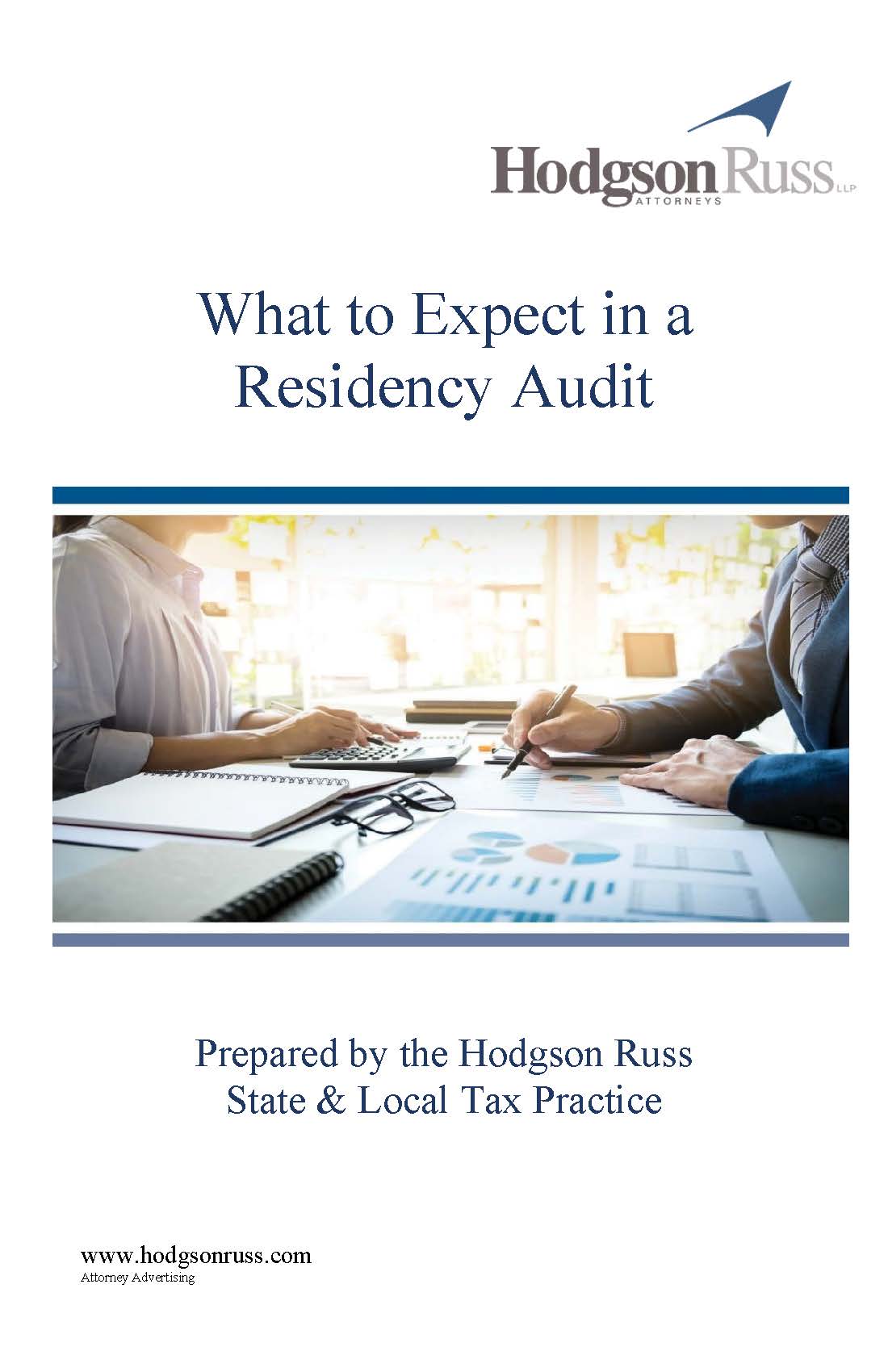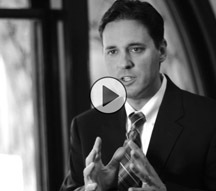
The New York State Department of Taxation and Finance conducts more residency audits and nonresident income allocation audits than any state in the nation. Hodgson Russ tax attorneys are at the forefront of many of these audits. In fact, high-ranking Tax Department officials have told us that Hodgson Russ handles more residency cases than any other law firm in the state.
We have numerous attorneys and paralegals dedicated to handling residency cases. Our team includes former residency auditors and the former head of tax enforcement at the Tax Department.
 While many practitioners in this area need to read books and articles to understand how these residency cases work, the Hodgson Russ attorneys have literally written the book on New York residency audits. Tim Noonan, Paul Comeau and Mark Klein are co-authors of the 2018 “New York Residency and Allocation Audit Handbook,” published by CCH and of its previously published 2014 version. Tim’s monthly column in State Tax Notes, “Noonan’s Notes,” regularly addresses residency topics.
While many practitioners in this area need to read books and articles to understand how these residency cases work, the Hodgson Russ attorneys have literally written the book on New York residency audits. Tim Noonan, Paul Comeau and Mark Klein are co-authors of the 2018 “New York Residency and Allocation Audit Handbook,” published by CCH and of its previously published 2014 version. Tim’s monthly column in State Tax Notes, “Noonan’s Notes,” regularly addresses residency topics.
The firm also publishes an easy-to-read, comprehensive guide, What to Expect in a Residency Audit, that many practitioners use as a guidebook for handling residency audits.
Our residency team has handled some of the most controversial and important residency cases over the past few years, including Matter of Gaied v. (NY) Tribunal, a 2014 victory in New York’s highest court that redefined the standard for taxation under New York’s statutory residency test. Many of these cases have received extensive coverage in publications such as “Forbes,” “The New York Times” and “The Wall Street Journal,” to name a few.
What Is a New York Residency Tax Audit?
Taxpayers may get a letter from the New York State Tax Department ("Tax Department") alerting them of an impending residency tax audit. Taxpayers affected by an audit will be investigated to determine whether they are residents or nonresidents of New York State and/or New York City. Since residents of New York State are subject to different taxes, the results can be significant.
If a taxpayer is deemed to be a New York State resident and has substantial investment income, they need to pay taxes on their worldwide income, meaning they may have to pay back taxes. If someone is a nonresident, they only need to pay taxes on a portion of their income, making this tax status important to defend.
During a New York City tax audit, an auditor will determine whether the taxpayer has a domicile in New York State, as defined under New York State law. Domicile depends not only on permanent place of abode, but also on where a person’s permanent residence is, based on logistics as well as emotional ties. In many cases, an auditor will consider whether someone has moved during an audit period and whether they have undergone significant life changes, such as marriage or divorce, or some other significant change. This may apply to “snowbirds.”
An auditor may claim that a taxpayer has changed his or her domicile by leaving an old residence and intending to permanently relocate to a new residence. Since it can be difficult to quantify feelings and intentions regarding residency, it’s important to consult with New York residency tax lawyers at Hodgson Russ LLP.
Our tax attorneys can help evaluate your domicile based on the Tax Department’s five factors:
- Home. Auditors will consider many factors, including home maintenance and where one spends holidays and special events when determining where a taxpayer calls home.
- Time. The time spent at home and the time involved in moving to a new home can help determine domicile.
- Active business involvement. For taxpayers who are in business or still working, auditors may examine where business decisions are made, where someone works and how they participate in business or work in New York State or New York City.
- Personal items. Auditors will often examine where treasured and important personal items are kept, using this as a determination of where the domicile is. They may use insurance paperwork or other proofs to establish whether items of personal import and substantial value are kept at a specific residence.
- Family members. The location where family -- especially children and spouses -- live, work and go to school is considered important. Traditionally, this factor been considered important in cases where the previous four factors cannot be used to establish domicile. However, family members may be used as part of an ongoing investigation.
Auditors are examining these factors and not just looking at the address on a driver’s license or voter registration to determine residency. Taxpayers who are concerned about any potential red flags should contact Hodgson Russ for representation and legal advice. Working with a tax residency attorney in New York can ensure that multiple homes or seemingly minor issues, such as keeping valuables at a second home, aren't used against a taxpayer in an audit.
Our attorneys are also leading technological changes in this area. As special legal advisors to the technology company Topia, Tim Noonan and Mark Klein assisted in the creation of a GPS-powered smartphone app and software service to help taxpayers track their time spent in various locations for tax purposes.
We believe you won’t find a more experienced team of professionals to handle your residency case. During the past 25 years, we have handled thousands of residency and income allocation cases. This includes representation of about 25 of the billionaires on the 2014 “Forbes Guide to the World’s Richest People.”
- Counsel in Multistate Residency Litigation
- Difficult New York Residency Audit on Behalf of New Jersey-Based Taxpayer
- New York and Florida Residency Planning
- New York State 548-Day Rule Tax Planning
- Tax Audit Representation Results in Cancellation of $1 Million Assessment
- Tax Counsel in Significant State Residency Case John Gaied v. New York State Tax Appeals Tribunal
In the News
- TaxStringer, September 1, 2023
- TaxStringer, August 1, 2023
- NerdWallet, May 16, 2023
- Law360, April 25, 2023
- Buffalo News, March 13, 2023
- Law360, February 17, 2023
- Law360, February 10, 2023
- Tax Notes, March 4, 2022
- The Palm Beach Post, November 19, 2020
- Leaving New York: High earners in finance and tech explain why they left the ‘world’s greatest city’CNBC, October 31, 2020
- Wall Street Journal, January 28, 2020
- Law360 Tax Authority State & Local, November 4, 2019
- Tax Notes State, November 4, 2019
- CNBC, November 1, 2019
- The New York Times, November 1, 2019
- The Washington Post, November 1, 2019
- CNN, November 1, 2019
- Forbes, October 31, 2019
- Forbes, October 21, 2019
- Wealth Strategies Journal, October 8, 2019
- Forever Young, October 2, 2019
- Newsday.com, September 23, 2019
- CNBC, September 13, 2019
- Nerd Wallet; The Associated Press, September 12, 2019
- Boston Globe, September 11, 2019
- Bloomberg News, July 23, 2018
- January 5, 2018
- Wall Street Journal, April 10, 2015
- Buffalo Law Journal, November 17, 2014
- Huffington Post, August 11, 2014
- Tax Analysts, June 30, 2014
- OUPblog, a publication of Oxford University Press, March 3, 2014
- FORTUNE, July 1, 2013
- Tax Stringer, March 5, 2013
- November 8, 2011
- March 28, 2011
- New York Times, February 23, 2011
Press Releases
- March 6, 2023
- Hodgson Russ Press Release, August 23, 2022
- Hodgson Russ Press Release, April 27, 2020
- Press Release, October 21, 2015
- Press Release, February 20, 2015
- Press Release, February 19, 2014
Publications
- Tax Notes State, January 15, 2024
- Tax Notes State, November 20, 2023
- Tax Notes State, June 26, 2023
- Tax Notes State, February 20, 2023
- Tax Notes State, December 19, 2022
- Tax Notes State, April 13, 2020
- Tax Notes State, March 30, 2020
- Tax Notes State, December 30, 2019
- New York State Residency Alert, September 15, 2017
- New York State Residency Alert, September 8, 2017
- Hodgson Russ Publication
- June 3, 2016
- Tax Stringer, October 2, 2015
- Tax Stringer, August 1, 2015
- State & Local Tax Alert, June 12, 2015
- State Tax Notes, June 1, 2015
- State & Local Tax Alert, April 30, 2015
- Tax Stringer, December 2014
- State Tax Notes, October 27, 2014
- Three Common Problems in Handling a New York Residency AuditTax Stringer, October 2014
- State Tax Notes, July 21, 2014
- State Tax Notes, May 19, 2014
- Journal of Multistate Taxation and Incentives , May 7, 2014
- State & Local Tax Alert, January 4, 2013
- State Tax Notes, April 30, 2012
- State Tax Notes, April 10, 2012
- Trusts & Estates, October 1, 2011
- State Tax Notes, July 18, 2011
- State & Local Tax Alert, June 23, 2011
- The Trusted Professional, June 2011
- State Tax Notes, March 8, 2011
- State Tax Notes, October 8, 2010
- State Tax Notes, December 2008
- State Tax Notes, July 30, 2007
Presentations & Events
- May 2, 2024
- Embassy Suites - Syracuse Destiny, November 1, 2023
- July 6, 2023
- May 16, 2023
- March 22, 2023
- September 20 - September 21, 2022
- April 6, 2022
- March 17, 2022
- Manalapan/Palm Beach, Boca Raton, Sarasota and Naples, Florida, February and March 2022
- August 25, 2021
- August 19, 2021
- June 2021
- June 24, 2021
- March 19, 2021
- February 26, 2021
- February 12, 2021
- December 3, 2020
- November 18, 2020
- October 21 & 28 and November 4 & 18
- October 27, 2020
- October 21, 2020
- June 18, 2020
- Wednesdays, May 6 - June 17
- June 12, 2020
- Boca Raton, Fort Lauderdale, Naples, Manalapan, Miami, Sarasota, Florida, January and February 2020
- Saratoga Springs, New York, October 17, 2019
- October 1, 2019
- Understanding New York State Tax Issues of 2019The Harvard Club 35 W. 44th Street, New York, NY, June 12 - August 7, 2019
- June 28, 2019
- June 25, 2019
- New York, New York, June 21, 2019
- June 14, 2019
- June 5, 2019
- Boca Raton, Fort Lauderdale, Naples, Manalapan, Sarasota, Florida, January and February 2019
- Saratoga Springs, New York, October 23, 2018
- Mahopac, New York, September 24, 2018
- September 21, 2018
- Palm Beach, Boca Raton and Naples, Florida, January, February & March 2018
- New York State Tax UpdateBrooklyn, NY, January 21, 2016
- New York Society of Independent Accountants Seminar: New York Residency/Non-Residency IssuesQueens, NY, September 2, 2015
- The Harvard Club, 35 W. 44th Street, New York, NY, Summer 2015
- Brooklyn, NY, May 19, 2015
- April 30, 2015
- June & July 2014


